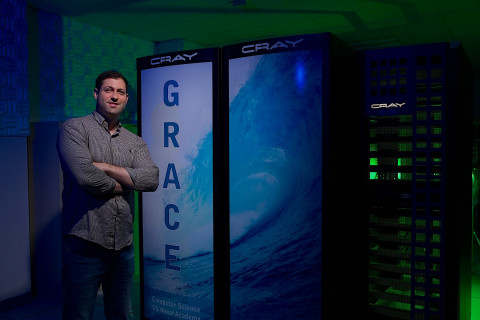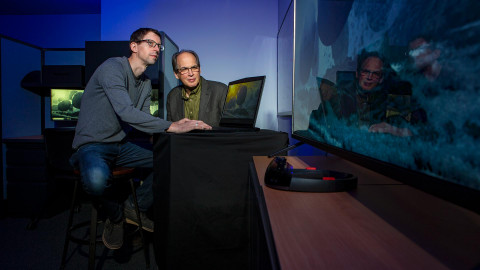Recent News & Accomplishments
2020
While deep learning is an increasingly popular form of artificial intelligence used in products and services that impact hundreds of millions of lives—it’s deployed in robots, driverless cars and systems that decide who should go to jail and who should get a credit card—no one quite understands how it actually works. Tom Goldstein , an associate professor of computer science with an appointment in the University of Maryland Institute for Advanced Computer Studies , recently joined a multi-institutional team of engineers, computer scientists, mathematicians and statisticians who are tasked... read more
This article is republished from Maryland Today Sci-Fi Social Distancing BY CHRIS CARROLL From meltdowns at Walmart over mask mandates to refusals to stay 6 feet from others at pool parties and political events, the COVID-19 pandemic has underlined something we already knew: People can get prickly when other people call them out for breaking rules. But what about a gentle hint from a robot? With help from National Science Foundation EAGER grant and other funding sources, a team of University of Maryland computing researchers is exploring how autonomous robots whisking smoothly through crowds... read more
The University of Maryland has a new four-year undergraduate program that combines art with computer science to prepare students to design and develop immersive media content and tools. The immersive media design (IMD) major is co-taught by art and computer science faculty with expertise in virtual and augmented reality, digital art, projected imagery, computer graphics, 3D modeling, and user interfaces spanning audio, visual and tactile platforms. “The goal is to graduate students who can collaborate effectively across creative and technical boundaries, and will excel in their field, whether... read more
This article is republished from Terp By Chris Carroll, Photo by Stephanie S. Cordle Pavan Ravindra ’21 stares intently at the jumbled Rubik’s Cube, then attacks. In the dim light of his College Park apartment and over the iffy video of a Zoom call, his hands dissolve in a blur of rapid twists and flips. He slams it down, solved, and hits the timer. The result: just under 10 seconds. What seems like a freakish display of skill, however, slightly embarrasses Ravindra, a dual-degree major in biochemistry and computer science. A world-class “cuber,” he’s often solved the Rubik’s Cube faster... read more
A University of Maryland expert in algorithms and high-performance computing has been funded by Google to develop computational techniques to improve contact tracing methods in the wake of COVID-19, research that could ultimately provide fundamental new insights into how epidemics can be controlled. Aravind Srinivasan , a Distinguished University Professor of computer science with an appointment in the University of Maryland Institute for Advanced Computer Studies , is one of the four principal investigators of the $140K project. He is joined by researchers from Princeton University and the... read more
Meet four impressive first-year CS Terps as they join UMD
Completing their high school careers and commencing their college ones while navigating the “new normal” of a global pandemic deserves credit on its own. But students in the University of Maryland’s incoming first-year class have accomplished much more. The group of around 4,300—including 500 computer science majors—is eager to meet new people, learn new things and start a new chapter. As they officially begin their time as Terps amid an unprecedented fall semester, meet four computer science majors below, virtually, of course: Faris Ali After graduating from Sunday school at his mosque,... read more
The University of Maryland’s undergraduate computer science program ranks No. 16 in the nation in the 2021 edition of U.S. News & World Report’s “Best Colleges.” The undergraduate program ranks 8th among public universities. In the computer science specialties, UMD ranks 9th in cybersecurity and 16th in artificial intelligence and data analytics/science. This is the first year the publication has ranked computer science undergraduate programs and specialties. “I am thrilled that we are ranked among the nation’s best computer science undergraduate programs,” said Matthias Zwicker, interim... read more
Professor Philip Resnik received an NSF grant from the Division of Information and Intelligent Systems for his project titled “ RI: Small: Modeling Co-Decisions: A Computational Framework Using Language and Metadata .” The funded project will develop computational models to help illuminate why and how individuals make similar or different choices, for example legislators in political contexts. The research focuses on going beyond previous factors like party and demographics to analyze similarities and differences in individuals' language, using techniques that identify interpretable, task-... read more
Computer scientists at the University of Maryland, College Park, are collaborating with child behavioral specialists at the University of Maryland, Baltimore, to improve telehealth services for children living in rural areas of the state, who are now even more isolated due to COVID-19. Aniket Bera , an assistant research professor in the University of Maryland Institute for Advanced Computer Studies (UMIACS), is principal investigator of the $90K award. Bera and Dinesh Manocha , the Paul Chrisman Iribe Professor of Computer Science, are working with psychiatric experts in Baltimore to develop... read more
Genomic sequencing data can often shed light on a wide array of scientific problems—from treating patients with heart disease and cancer to understanding how certain pathogens can affect plants and animals. Public repositories of genomic data are becoming more commonplace and are growing at an exponential rate. The National Center for Biotechnology Information (NCBI), for example, runs the Sequence Read Archive (SRA), a repository that holds raw scientific data for a vast number of scientific experiments conducted using high-throughput sequencing data. While repositories like the SRA are a... read more









